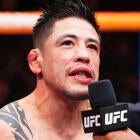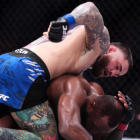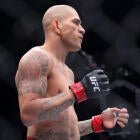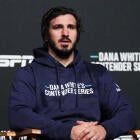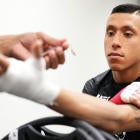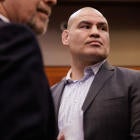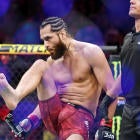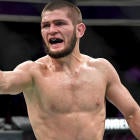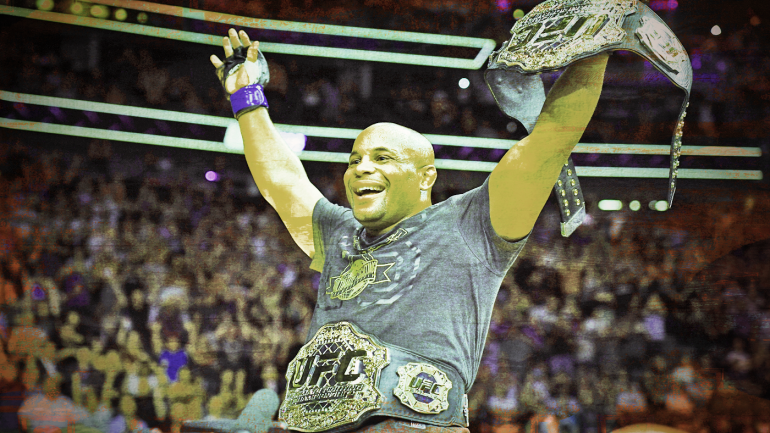
If you ask Daniel Cormier an honest question, you'll typically get a lot more than an honest answer in return. Maybe it's his training as a seasoned broadcaster or just the humility and introspection that has long made him a media darling to interview.
Either way, the former two-division UFC champion is as forthcoming as he is passionate about how he will be remembered entering what could be the final fight of his career on Saturday when he challenges Stipe Miocic in their heavyweight championship trilogy bout headlining UFC 252 in Las Vegas.
So when it came time to look back at what went wrong the last time DC stepped foot inside the Octagon in August 2019 when Miocic (19-3) rallied to finish him in Round 4 of their rematch to regain the title, the 41-year-old Cormier doesn't hide from the underlying narrative that followed such a disappointing defeat.
Anyone who watched Cormier score a first-round knockout over Miocic in their 2018 first meeting only to dominate the opening round of their rematch before visibly fading down the stretch had to question whether the 37-year-old Miocic actually won that it more that Cormier lost it.
One year later, the competitor deep inside Cormier (19-3) agrees.
"I do, I feel like I let him off the hook," Cormier told CBS Sports' "State of Combat" podcast this week. "I feel like I was winning the vast majority of the fight. I do believe that I'm a better fighter than Stipe Miocic. I feel that I can grapple better and wrestle. Even in the standup, I have a more well-rounded game and I can beat him anywhere. I plan on proving that on Saturday. I am not going to allow him to dictate this fight to me."
Can't get enough UFC? Subscribe to our podcast State of Combat with Brian Campbell where we break down everything you need to know in the Octagon, including the complete interview with Cormier below.
Hindsight is always 20/20 in the fight game, and few fighters are able to lose big without some kind of excuse. Cormier doesn't have one, per se, and is quick to laud Miocic with credit for the victory. But he also doesn't lie to himself -- or anyone else, for that matter -- when pressed for the truth about what really went on from his prideful disinterest for coach Javier Mendez's game plan during the heat of the battle or the seeming lack of respect he showed for Miocic's punching power while walking forward with his hands down.
Piecing together DC's clear-headed thoughts makes you wonder how much he was seduced by the lure of gambling while bankrolled with house money entering the rematch.
Years of frustration at being a bridesmaid at light heavyweight following two bitter losses to chief rival Jon Jones were refreshingly erased -- or, at the very least, dulled -- by the sensation of becoming just the second fighter to hold two UFC titles simultaneously. Even better, the matter in which he finished Miocic, who entered knighted as the most accomplished heavyweight champion in UFC history, seemed to almost come too easy.
Fast forward four months in late 2018 and Cormier accepted a big payday to defend his heavyweight belt on short notice against Derrick Lewis at New York's Madison Square Garden where he became the first UFC champion to defend titles in two divisions. Once again, it was accomplished with relative ease, all the while as DC essentially ignored a serious back injury that would require surgery a month later.
So when it came time to prepare a second time for Miocic, Cormier uncharacteristically cut corners.
"I did not have the cardio I needed for that fight but, sadly, you can convince yourself of anything when you are preparing," Cormier said. "We made a lot of concessions in that training camp. Back started feeling a little tight? Let's slow it down. This started feeling a little tight? Let's slow it down. It was always let's slow it down and let's be safe but, in reality, when you are fighting for the championship of the world you can't be safe. You have to be able to go and do everything to prepare yourself."
Cormier can also admit now he fought too emotional, a mistake he hadn't made since his first loss to Jones in 2015 when the bitterness between the two left DC more focused on hurting his opponent than winning. The judgment lapse against Miocic was fueled much more by overconfidence.
"I felt like he was there to be hit and I just felt like I didn't fight a smart fight," Cormier said. "That's a hard pill for me to swallow. I feel like I have a decent fight IQ and know how to do things the way you are supposed to. I just didn't fight good enough and didn't fight hard enough. And sadly, I was fatigued. He went to the body and hurt me and those last two shots up top really did mess me up. I didn't feel like anything would hurt me until it's too late to realize that it actually is."
Luckily for Cormier, his shot at redemption inside the UFC Apex facility offers an almost unparalleled amount of history and credentials to the legacies of both competitors than any other fight in UFC history. Not only will a winner be crowned in what could go down as the best trilogy in MMA history, the same man will garner the almost indisputable title of greatest UFC heavyweight of all-time.
Many fighters aren't willing to discuss legacy until their careers are long finished while even more dismiss the topic as podcast and radio filler for journalists and fans in favor of the sport's financial rewards. Consider Miocic as more of a member of that guild after telling CBS Sports in May he couldn't care less if his career ended without facing Cormier a third time and has no emotional connection to the idea that the two fighters be remembered as MMA's answer to Muhammad Ali and Joe Frazier as far as competitive rivals.
Cormier is the exact opposite. He doesn't shy away from the importance of fighting for his legacy or how much of it will ultimately be at stake by whether or not he wins on Saturday.
"If I don't prepare with the idea that this defines who I am when I leave mixed martial arts, I will not leave every stone unturned," Cormier said. "I have prepared as if this will define me. All the championship belts and all the victories have led me to this third fight with Stipe Miocic. I could not be happier to be in this situation with all that is on the line in terms of the fight. Not only the title but the legacy and the chance to be called the greatest heavyweight in UFC history. That's amazing. All that pressure is wanted in this camp."
With that pressure comes an interesting micro-debate, however, involving just how drastic Cormier's legacy would be affected by a loss when you consider the unique nature of his resume.
Cormier won the the UFC's light heavyweight title without ever beating Jones yet appeared to enter the rarefied air of the G.O.A.T. debate when he knocked out Miocic and saw his name linked with other immortals like Jones, Anderson Silva, Georges St-Pierre, Demetrious Johnson and Fedor Emelianenko. While an admittedly fickle reaction, some experts removed DC from said conversation after he lost to Miocic in their rematch, essentially demoting him from the upper table of all-time great to simply a future Hall-of-Fame legend.
What would a second loss to Miocic do when you consider that the other name often linked to the greatest UFC heavyweight discussion, former two-time champion Cain Velasquez, is a fighter Cormier purposely never faced and the reason he cut down to 205 pounds in the first place out of respect for a man who is his teammate, coach and friend?
This is where Cormier's legacy talk gets a bit defensive.
"I think when I won that [heavyweight] belt in July 2018, my legacy was secured and there is nothing that should change that," Cormier said. "The reality is Anderson Silva now has nine losses but when he loses to guys like [Israel Adesanya] -- who is the now the champ and is phenomenal -- and is in a fight like he was with Derek Brunson, that doesn't eliminate all he did in the past. We still have to look back to the time when Anderson Silva walked in there and it was an event. He was the greatest fighter in the world. Georges St-Pierre can come back and what if [he] fights Khabib [Nurmagomedov] and loses? That won't change anything. When Demetrious Johnson lost to Henry Cejudo it didn't change anything.
"If it's that simple [and one loss can erase his current standing] than what does it truly matter? You can't revisit things and just change the way that you perceive things. I think all of the things that these phenomenal fighters have done should stand the test of time."
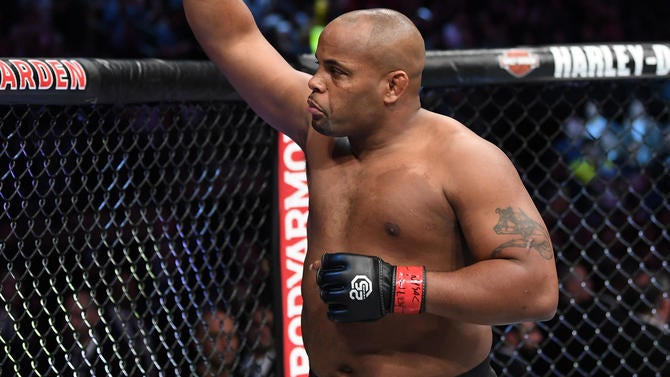
So is a third Miocic fight one that will be contested for Cormier's legacy or not? The answer for DC has less to do with what the general public defines as how he will be remembered and more to do with how comfortable he is at putting his head on the pillow at night and knowing where he stands.
"For me, I'm trying to fight this fight for me. I want to win this belt back for me and my family," Cormier said. "If people don't recognize the things that I have done in mixed martial arts at this point, there is nothing else to do because any time you are first and can go into a sport like MMA and you are a first at something so big, you have to be considered one of the greatest to do it. Especially when that first is being the first fighter to win championships in two divisions and defend them both. That is something that is so big that people never ever dreamed of. When you are the first to do that, no one can chip away at your legacy."
Asked how confident he is that this will actually be the last fight of his career, even with the likelihood that a win fields him offers from UFC president Dana White to fight Jones a third time for truckloads of money, Cormier calmly said he's "pretty sure" this is it. He has no retirement gestures planned of laying his gloves down in the center of the cage yet claims he's fully at ease with walking away, win or lose, this weekend after everything he has accomplished.
So what does it look like in his mind when he imagines that moment on Saturday? The question sparks nostalgia and brings Cormier all the way back to July 2009 when, two months before his pro debut, Cormier watched the landmark UFC 100 card as a fan and imagined himself one day in the role of Brock Lesnar defending his heavyweight championship in his rematch against Frank Mir in the main event.
Cormier, who was then in the midst of transitioning to the sport at age 30 from a decorated amateur wrestling career, fondly remembers being nicknamed "Kung Fu Panda" by his newfound MMA teammates because he and his robust frame had no idea how to throw a punch or strike on the professional level.
"I didn't know what I was doing but I had this dream of going to fight and some day fighting in the UFC," Cormier said. "I never thought that 11 years later, I would be the guy who was at that table in the conversation for one of the greatest fighters of all-time.
"When I win the fight, I'm just going to feel happy that this career has been better than I ever could have envisioned. I could never have dreamt that I could be where I am today in terms of my life, legacy and career. I never could have thought that I could be this person. Everyone starts mixed martial arts with a dream -- to be the best and become the champ and have Dana [White] put the belt around your waist. I lived that dream and I my life is so much better for all of those different experiences I had. I would lay on that pillow and say to myself that it actually went better than we ever could have thought."
Who will win UFC 252, and how exactly will each fight end? Visit SportsLine now to get detailed picks on every fight on Saturday's card, all from the accomplished expert who's up over $20,000 and has nailed 16 of the last 18 UFC main events.
![[object Object] Logo](https://sportshub.cbsistatic.com/i/2020/04/22/e9ceb731-8b3f-4c60-98fe-090ab66a2997/screen-shot-2020-04-22-at-11-04-56-am.png)








